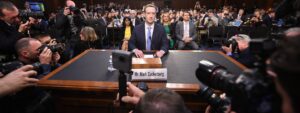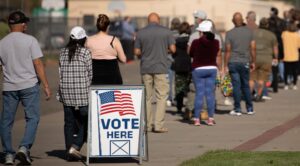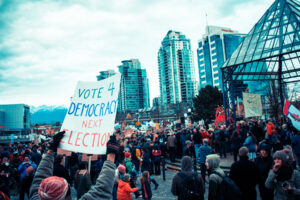

April 2024, Volume 35, Issue 2
America’s Crisis of Civic Virtue
The problem for democracy today is not capitalism; it is a decline in public honesty and civility. But there is an opportunity to revive our sense of national community, if we seize it.


April 2024, Volume 35, Issue 2
The problem for democracy today is not capitalism; it is a decline in public honesty and civility. But there is an opportunity to revive our sense of national community, if we seize it.


April 2024, Volume 35, Issue 2
Liberal societies are those which offer refuge from the very people they empower—through individual choice, mobility, and the possibility of exit. This is the form of liberty that most clearly elevates the liberal project.
April 2024, Volume 35, Issue 2
The power of liberalism—though limited and never revered—enables it to serve as refuge while taming the demons of liberal society.
April 2024, Volume 35, Issue 2
The liberal emphasis on unhindered mobility comes with costs, particularly for those unable to leave.
April 2024, Volume 35, Issue 2
What distinguishes liberal societies from all others is that they tolerate immoral behavior. It is this tolerance that protects us not just from our leaders but ourselves.
April 2024, Volume 35, Issue 2
The belief we can “escape” remains a part of the liberal imagination. In truth, it is realized in the form of detachment from any community, an exodus without refuge.
April 2024, Volume 35, Issue 2
A liberal society must reckon the demands of the common good, while offering what we most crave—something worth sacrificing for.
April 2023, Volume 34, Issue 2
The global democratic decline of the last two decades is rarely discussed in the same breath with the 2003 decision by the United States and Britain to invade Iraq. But the roots of our present disorder can be traced to that disastrous and foolhardy war of choice.
July 2022, Volume 33, Issue 3
Does the author of the nineteenth-century classic, Democracy in America, still matter?
April 2022, Volume 33, Issue 2
China’s ability to shape the global entertainment industry extends well beyond films, and it no longer rests solely on the allure of big markets. Beijing is exerting newfound leverage that is making giant U.S. media companies do its bidding.


October 2021, Volume 32, Issue 4
In a deeply polarized United States, ordinary people now consume and espouse once-radical ideas and are primed to commit violence.
July 2021, Volume 32, Issue 3
With or without middleware, the basic challenge of responding to bad actors online remains.
July 2021, Volume 32, Issue 3
To stop surveillance capitalism, take aim at the targeted advertising that fuels it.
July 2021, Volume 32, Issue 3
Comprehensive regulation can strengthen user rights in the face of tech firms’ exploitative practices.

July 2021, Volume 32, Issue 3
Bringing middleware from theory to practice will require addressing thorny questions about revenue, cost, feasibility, and privacy.


July 2021, Volume 32, Issue 3
Despite the challenges, middleware offers a legally and politically feasible answer to platforms’ influence over speech.
April 2021, Volume 32, Issue 2
Recent survey research suggests that most voters disapprove of antidemocratic acts by elected leaders. Yet there are critical exceptions when a significant minority of voters are sympathetic to or even supportive of violations of democratic laws and norms.


April 2021, Volume 32, Issue 2
The covid-19 pandemic nearly upended the U.S. election, but after a rocky primary season changes were made to save it. Alarmingly, however, a large portion of voters have rejected the result. The challenge of overcoming lies about a “rigged” election is great.

October 2017, Volume 28, Issue 4
“Democratic deconsolidation” on the level of attitudes and beliefs is real, and behind it lies a disturbing rise in tolerance for antisocial behavior, especially among the young.

April 2017, Volume 28, Issue 2
The Editors’ introduction to “The 2016 U.S. Election.”

April 2017, Volume 28, Issue 2
Rising populism in the U.S. and beyond is calling into question the liberal-democratic bargain that has defined the postwar era. What led to Americans’ present revolt against elites, and what are its implications?
April 2017, Volume 28, Issue 2
Three factors help to explain the historically wide split between the electoral and popular vote counts: economic and political fundamentals, polarization among voters over identity issues, and the sharply divergent ways in which the candidates chose to address these issues.
April 2017, Volume 28, Issue 2
Since the 1970s, the U.S. presidential-nomination system has become more democratic, making primary elections crucial, reducing the influence of political parties, and making it easier for outsiders to win.
April 2017, Volume 28, Issue 2
In 2016, concerns about the administration of elections in the United States generated highly charged partisan debates. Are the worries justified?

April 2017, Volume 28, Issue 2
Traditional intermediary institutions such as parties and the legacy media are not what they once were, and they are not coming back. What are the implications of new social media and digital-campaign techniques?
April 2012, Volume 23, Issue 2
A review of Crafting State-Nations: India and Other Multinational Democracies by Alfred Stepan, Juan J. Linz, and Yogendra Yadav.


April 2010, Volume 21, Issue 2
How do democracies deal with the deep divisions created by race, ethnicity, religion, and language? The cases of Canada, India, and the United States show that democratic institutions—notably, competitive elections and independent judiciaries—can bridge divides and build stability, but they must find a way to manage the tension between individual and group equality.
January 2010, Volume 21, Issue 1
The crisis of the 9/11 terrorist attacks has sparked a surge of increased civic engagement by young people in the United States, but there is also evidence of a growing divide along class lines.
April 2008, Volume 19, Issue 2
Democracy assistance has been a growing priority for the United States since the end of the Cold War. The record shows that its focus goes well beyond elections and other procedural dimensions of democracy.
April 2001, Volume 12, Issue 2
In postindustrial societies, class is less important as a source of party cleavage. With the European left embracing a market-friendly “third way,” political divisions in Europe are increasingly resembling those in the United States.
April 2001, Volume 12, Issue 2
The Editors’ introduction to “Revisiting Florida 2000.”
April 2001, Volume 12, Issue 2
April 2001, Volume 12, Issue 2
April 2001, Volume 12, Issue 2
April 2001, Volume 12, Issue 2
April 2001, Volume 12, Issue 2
April 2001, Volume 12, Issue 2
January 2000, Volume 11, Issue 1
January 2000, Volume 11, Issue 1
January 2000, Volume 11, Issue 1
January 2000, Volume 11, Issue 1
October 1998, Volume 9, Issue 4
January 1997, Volume 8, Issue 1
January 1996, Volume 7, Issue 1
A review of Why Parties? The Origin and Transformation of Party Politics in America, by John H. Aldrich.
July 1995, Volume 6, Issue 3

January 1995, Volume 6, Issue 1
Something happened in America starting in the mid-to-late twentieth century to diminish civic engagement and social connectedness. What could that “something” be? Why were fewer and fewer Americans going the polls, the pews, and town halls?
July 1993, Volume 4, Issue 3
Fall 1991, Volume 2, Issue 4
Fall 1991, Volume 2, Issue 4
A review of Exporting Democracy: Fulfilling America’s Destiny, by Joshua Muravchik and Exporting Democracy: The United States and Latin America, edited by Abraham F. Lowenthal.

There is nothing inherently menacing or antidemocratic about conspiracy theories. They can even be a source of amusement. The trouble comes when political elites weaponize them to invite violence.

Moscow and China pose a great danger to the democratic world. But they pose threats that need to be managed, not won. Every great foreign-policy battle doesn’t end with a decisive victory.

The case for liberal democracy remains powerful. It may get its biggest boost in the near term from success on the battlefields of Ukraine.

Many derided it as naïve idealism, but the vision undergirding the Freedom Agenda offers lessons for the biggest global tests of our time.